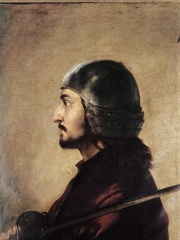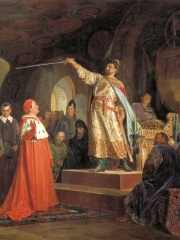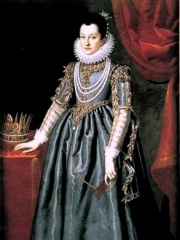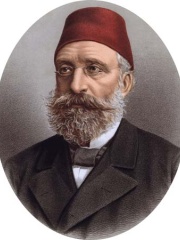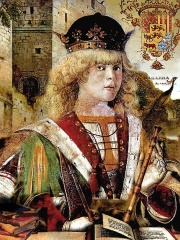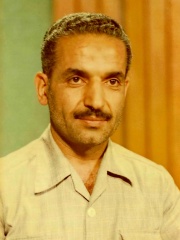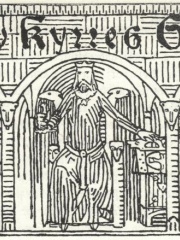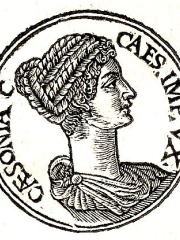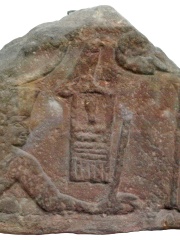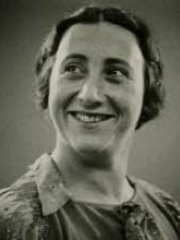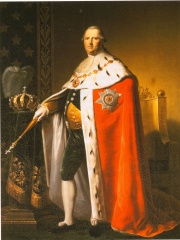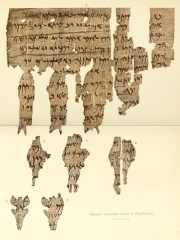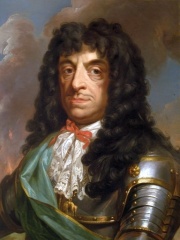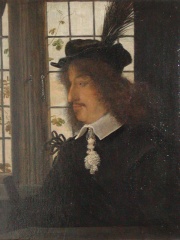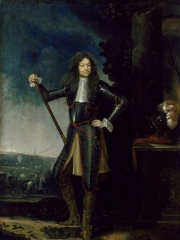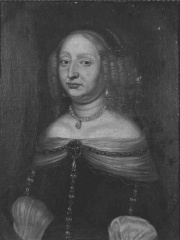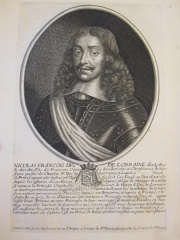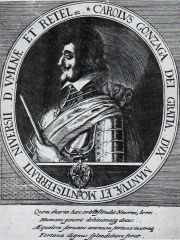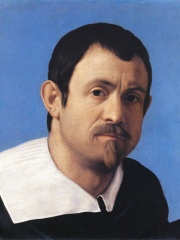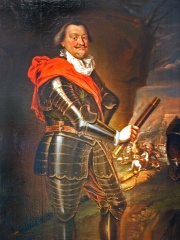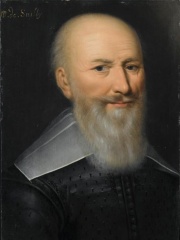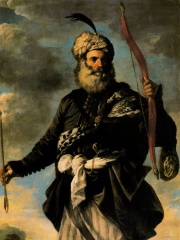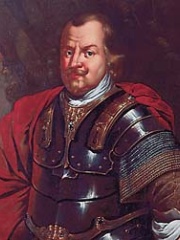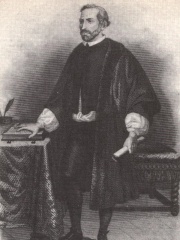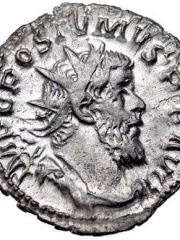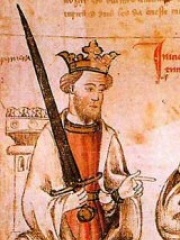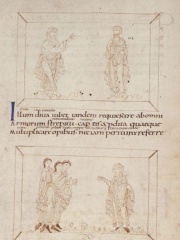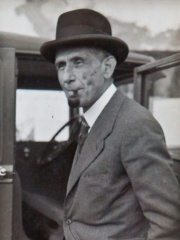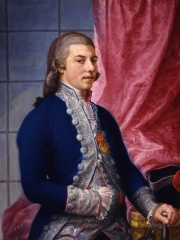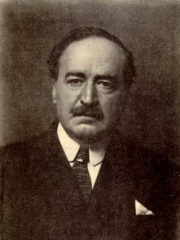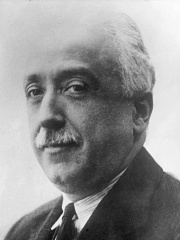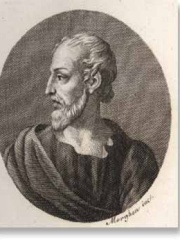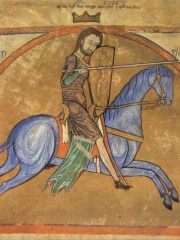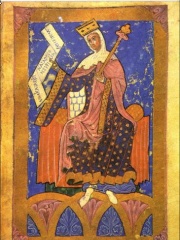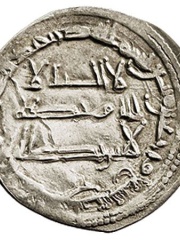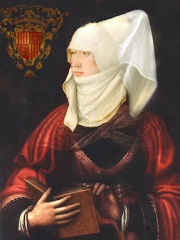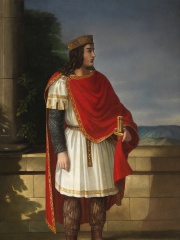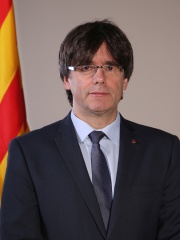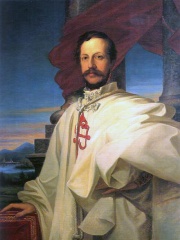POLITICIAN
Cardinal-Infante Ferdinand of Austria
1609 - 1641
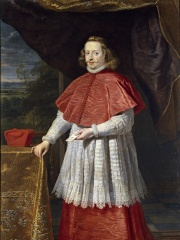
 Cardinal-Infante Ferdinand of Austria
Cardinal-Infante Ferdinand of Austria
Cardinal-Infante Ferdinand (also known as Don Fernando de Austria, Cardenal-Infante Fernando de España and as Ferdinand von Österreich; 16 May 1609 – 9 November 1641) was a Spanish and Portuguese prince (Infante of Spain, Infante of Portugal (until 1640)), Governor of the Spanish Netherlands, Cardinal of the Holy Catholic Church, Archduke of Austria, Archbishop of Toledo (1619–1641), and a general during the Thirty Years' War, the Eighty Years' War, and the Franco-Spanish War. He is commonly considered the last great commander and strategist of the Spanish Empire, whose premature death in a critical moment helped bring about the end of Spanish hegemony in Europe. Read more on Wikipedia
His biography is available in 23 different languages on Wikipedia. Cardinal-Infante Ferdinand of Austria is the 3,655th most popular politician (down from 3,223rd in 2024), the 302nd most popular biography from Spain (down from 283rd in 2019) and the 104th most popular Spanish Politician.
Cardinal-Infante Ferdinand of Austria was the son of Philip III of Spain and Margaret of Austria. He was a member of the House of Habsburg and was the Grand Master of the Teutonic Knights. Cardinal-Infante Ferdinand is most famous for being the ruler of the Spanish Netherlands from 1634 until his death in 1641.
Memorability Metrics
Page views of Cardinal-Infante Ferdinand of Austria by language
Among POLITICIANS
Among politicians, Cardinal-Infante Ferdinand of Austria ranks 3,655 out of 19,576. Before him are Jahan Shah, Roman the Great, Christina of Lorraine, Midhat Pasha, Francis Phoebus of Navarre, and Mohammad-Ali Rajai. After him are Olaf III of Norway, Milonia Caesonia, Sanakht, Edith Frank, Frederick I of Württemberg, and Amyrtaeus.
Most Popular Politicians in Wikipedia
Go to all RankingsJahan Shah
1397 - 1467
HPI: 68.51
Rank: 3,651
Roman the Great
1150 - 1205
HPI: 68.50
Rank: 3,652
Christina of Lorraine
1565 - 1637
HPI: 68.50
Rank: 3,653
Midhat Pasha
1822 - 1883
HPI: 68.50
Rank: 3,654
Francis Phoebus of Navarre
1467 - 1483
HPI: 68.50
Rank: 3,655
Mohammad-Ali Rajai
1933 - 1981
HPI: 68.50
Rank: 3,656
Cardinal-Infante Ferdinand of Austria
1609 - 1641
HPI: 68.50
Rank: 3,657
Olaf III of Norway
1050 - 1093
HPI: 68.50
Rank: 3,658
Milonia Caesonia
7 - 41
HPI: 68.50
Rank: 3,659
Sanakht
2700 BC - 2715 BC
HPI: 68.50
Rank: 3,660
Edith Frank
1900 - 1945
HPI: 68.49
Rank: 3,661
Frederick I of Württemberg
1754 - 1816
HPI: 68.49
Rank: 3,662
Amyrtaeus
450 BC - 399 BC
HPI: 68.49
Rank: 3,663
Contemporaries
Among people born in 1609, Cardinal-Infante Ferdinand of Austria ranks 6. Before him are Henrietta Maria of France, John II Casimir Vasa, Frederick III of Denmark, Judith Leyster, and Raimondo Montecuccoli. After him are Sophia Eleonore of Saxony, Nicholas Francis, Duke of Lorraine, Charles II Gonzaga, Duke of Nevers, Giovanni Battista Salvi da Sassoferrato, Hanzade Sultan, and Ernest Günther, Duke of Schleswig-Holstein-Sonderburg-Augustenburg. Among people deceased in 1641, Cardinal-Infante Ferdinand of Austria ranks 5. Before him are Anthony van Dyck, George, Duke of Brunswick-Calenberg, Gwanghaegun of Joseon, and Domenichino. After him are Jane Frances de Chantal, Thomas Mun, Jeremiah Horrocks, Maximilien de Béthune, Duke of Sully, Jan Janszoon, Johan Banér, and Pau Claris i Casademunt.
Others Born in 1609
Go to all RankingsHenrietta Maria of France
COMPANION
1609 - 1669
HPI: 79.54
Rank: 1
John II Casimir Vasa
POLITICIAN
1609 - 1672
HPI: 74.33
Rank: 2
Frederick III of Denmark
POLITICIAN
1609 - 1670
HPI: 74.19
Rank: 3
Judith Leyster
PAINTER
1609 - 1660
HPI: 70.60
Rank: 4
Raimondo Montecuccoli
MILITARY PERSONNEL
1609 - 1680
HPI: 70.27
Rank: 5
Cardinal-Infante Ferdinand of Austria
POLITICIAN
1609 - 1641
HPI: 68.50
Rank: 6
Sophia Eleonore of Saxony
POLITICIAN
1609 - 1671
HPI: 66.49
Rank: 7
Nicholas Francis, Duke of Lorraine
POLITICIAN
1609 - 1670
HPI: 65.99
Rank: 8
Charles II Gonzaga, Duke of Nevers
NOBLEMAN
1609 - 1631
HPI: 65.89
Rank: 9
Giovanni Battista Salvi da Sassoferrato
PAINTER
1609 - 1685
HPI: 64.39
Rank: 10
Hanzade Sultan
NOBLEMAN
1609 - 1650
HPI: 64.20
Rank: 11
Ernest Günther, Duke of Schleswig-Holstein-Sonderburg-Augustenburg
NOBLEMAN
1609 - 1689
HPI: 63.95
Rank: 12
Others Deceased in 1641
Go to all RankingsAnthony van Dyck
PAINTER
1599 - 1641
HPI: 80.23
Rank: 1
George, Duke of Brunswick-Calenberg
NOBLEMAN
1582 - 1641
HPI: 72.50
Rank: 2
Gwanghaegun of Joseon
POLITICIAN
1575 - 1641
HPI: 71.39
Rank: 3
Domenichino
PAINTER
1581 - 1641
HPI: 71.11
Rank: 4
Cardinal-Infante Ferdinand of Austria
POLITICIAN
1609 - 1641
HPI: 68.50
Rank: 5
Jane Frances de Chantal
RELIGIOUS FIGURE
1572 - 1641
HPI: 67.40
Rank: 6
Thomas Mun
ECONOMIST
1571 - 1641
HPI: 67.38
Rank: 7
Jeremiah Horrocks
ASTRONOMER
1618 - 1641
HPI: 65.85
Rank: 8
Maximilien de Béthune, Duke of Sully
POLITICIAN
1560 - 1641
HPI: 65.38
Rank: 9
Jan Janszoon
PIRATE
1570 - 1641
HPI: 65.36
Rank: 10
Johan Banér
MILITARY PERSONNEL
1596 - 1641
HPI: 65.22
Rank: 11
Pau Claris i Casademunt
POLITICIAN
1586 - 1641
HPI: 61.90
Rank: 12
In Spain
Among people born in Spain, Cardinal-Infante Ferdinand of Austria ranks 302 out of 3,355. Before him are Postumus (250), Iker Casillas (1981), Carles Rexach (1947), Sancho IV of Castile (1258), Eulalia of Barcelona (290), and Carlos Sainz (1962). After him are Prudentius (348), Pompeu Fabra (1868), Manuel Godoy (1767), Vicente Blasco Ibáñez (1867), Niceto Alcalá-Zamora (1877), and Silius Italicus (26).
Others born in Spain
Go to all RankingsPostumus
POLITICIAN
250 - 269
HPI: 68.59
Rank: 296
Iker Casillas
SOCCER PLAYER
1981 - Present
HPI: 68.53
Rank: 297
Carles Rexach
SOCCER PLAYER
1947 - Present
HPI: 68.52
Rank: 298
Sancho IV of Castile
POLITICIAN
1258 - 1295
HPI: 68.52
Rank: 299
Eulalia of Barcelona
RELIGIOUS FIGURE
290 - 303
HPI: 68.51
Rank: 300
Carlos Sainz
RACING DRIVER
1962 - Present
HPI: 68.50
Rank: 301
Cardinal-Infante Ferdinand of Austria
POLITICIAN
1609 - 1641
HPI: 68.50
Rank: 302
Prudentius
WRITER
348 - 413
HPI: 68.49
Rank: 303
Pompeu Fabra
LINGUIST
1868 - 1948
HPI: 68.45
Rank: 304
Manuel Godoy
POLITICIAN
1767 - 1851
HPI: 68.44
Rank: 305
Vicente Blasco Ibáñez
WRITER
1867 - 1928
HPI: 68.43
Rank: 306
Niceto Alcalá-Zamora
POLITICIAN
1877 - 1949
HPI: 68.43
Rank: 307
Silius Italicus
WRITER
26 - 101
HPI: 68.43
Rank: 308
Among POLITICIANS In Spain
Among politicians born in Spain, Cardinal-Infante Ferdinand of Austria ranks 104. Before him are Ferdinand II of León (1137), Urraca of León (1081), Muhammad I of Córdoba (823), Blanche I of Navarre (1387), Postumus (250), and Sancho IV of Castile (1258). After him are Manuel Godoy (1767), Niceto Alcalá-Zamora (1877), Alfonso II of Asturias (759), Wittiza (687), Carles Puigdemont (1962), and Charles II, Duke of Parma (1799).
Ferdinand II of León
1137 - 1188
HPI: 68.79
Rank: 98
Urraca of León
1081 - 1126
HPI: 68.73
Rank: 99
Muhammad I of Córdoba
823 - 886
HPI: 68.72
Rank: 100
Blanche I of Navarre
1387 - 1441
HPI: 68.64
Rank: 101
Postumus
250 - 269
HPI: 68.59
Rank: 102
Sancho IV of Castile
1258 - 1295
HPI: 68.52
Rank: 103
Cardinal-Infante Ferdinand of Austria
1609 - 1641
HPI: 68.50
Rank: 104
Manuel Godoy
1767 - 1851
HPI: 68.44
Rank: 105
Niceto Alcalá-Zamora
1877 - 1949
HPI: 68.43
Rank: 106
Alfonso II of Asturias
759 - 842
HPI: 68.30
Rank: 107
Wittiza
687 - 710
HPI: 68.28
Rank: 108
Carles Puigdemont
1962 - Present
HPI: 68.27
Rank: 109
Charles II, Duke of Parma
1799 - 1883
HPI: 68.26
Rank: 110
